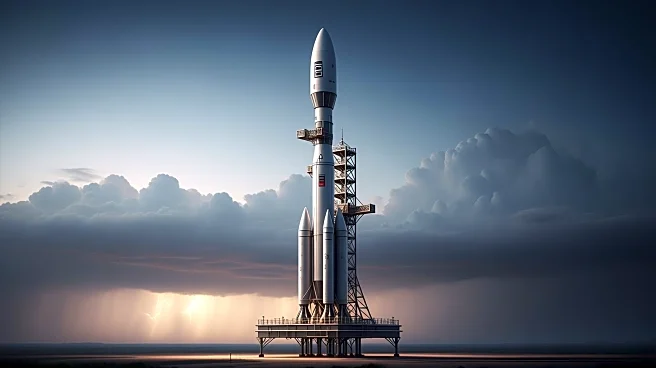What's Happening?
Blue Origin's New Glenn mission, intended to launch NASA's ESCAPADE probes to Mars, was postponed due to adverse weather conditions and new FAA restrictions. Originally scheduled for November 9, the launch was scrubbed because of thick clouds and a cruise
ship entering the restricted zone. The next attempt is set for November 12, with a launch window from 2:50 to 4:17 p.m. EST. The mission involves sending two identical satellites, 'Blue' and 'Gold', to study Mars' magnetosphere and atmosphere, contributing to understanding the planet's climate history and habitability. The launch is significant as it marks NASA's first Mars mission in over five years and Blue Origin's first customer-carrying orbital mission on New Glenn.
Why It's Important?
The rescheduled launch is crucial for both NASA and Blue Origin. For NASA, the ESCAPADE mission offers valuable insights into Mars' atmospheric conditions, which are essential for future space exploration and potential human missions. For Blue Origin, a successful launch would validate New Glenn's capabilities and enhance its reputation in the commercial space sector. The mission's success could accelerate Blue Origin's path to regular orbital service, impacting the competitive landscape of space exploration and commercial satellite launches. The FAA's new restrictions highlight the challenges faced by commercial space companies in navigating regulatory environments.
What's Next?
The next launch attempt is scheduled for November 12, with Blue Origin coordinating closely with the FAA to ensure compliance with new daytime launch restrictions. The company plans to land the booster on its Atlantic platform, Jacklyn, contingent on favorable sea conditions. Industry observers will be watching closely, as a successful mission could bolster Blue Origin's standing and influence future regulatory policies. NASA and Blue Origin will continue to monitor weather conditions, which remain a critical factor in determining the feasibility of the launch.
Beyond the Headlines
The postponement due to FAA restrictions underscores the growing complexity of commercial space operations, where regulatory compliance is as crucial as technical readiness. This situation reflects broader challenges in balancing innovation with safety and regulatory oversight. The mission's success could pave the way for more frequent and reliable commercial space launches, potentially reshaping the industry's dynamics and encouraging further investment in space exploration technologies.
















